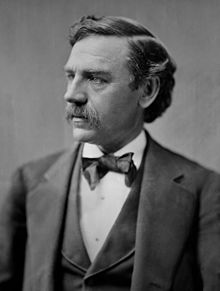
Back ويليام بي. فراي Arabic ويليام پى. فرى ARZ ویلیام پی. فرای AZB William P. Frye German ویلیام پی. فرای Persian William P. Frye French William P. Frye Hungarian Фрай, Уильям Пирс Russian William P. Frye SIMPLE William P. Frye Swedish
William Pierce Frye | |
|---|---|
 Frye c. 1880 | |
| President pro tempore of the United States Senate | |
| In office February 7, 1896 – April 27, 1911 | |
| Preceded by | Isham G. Harris |
| Succeeded by | Rotating pro terms |
| United States Senator from Maine | |
| In office March 18, 1881 – August 8, 1911 | |
| Preceded by | James G. Blaine |
| Succeeded by | Obadiah Gardner |
| Chairman of the House Republican Conference | |
| In office March 4, 1879 – March 3, 1881 | |
| Speaker | Samuel J. Randall |
| Preceded by | Eugene Hale |
| Succeeded by | George M. Robeson |
| Member of the U.S. House of Representatives from Maine's 2nd district | |
| In office March 4, 1871 – March 17, 1881 | |
| Preceded by | Samuel P. Morrill |
| Succeeded by | Nelson Dingley, Jr. |
| Maine Attorney General | |
| In office 1867–1871 | |
| Governor | Joshua Chamberlain |
| Preceded by | John A. Peters |
| Succeeded by | Thomas Brackett Reed |
| Member of the Maine House of Representatives | |
| In office 1861–1862, 1867 | |
| Personal details | |
| Born | September 2, 1830 Lewiston, Maine, U.S. |
| Died | August 8, 1911 (aged 80) Lewiston, Maine, U.S. |
| Resting place | Riverside Cemetery |
| Political party | Republican |
| Relations | Wallace H. White Jr. (grandson) |
| Alma mater | Bowdoin College Bates College (LL.D.) |
| Occupation |
|
| Signature | |
William Pierce Frye (September 2, 1830 – August 8, 1911) was an American politician from Maine. A member of the Republican Party, Frye spent most of his political career as a legislator, serving in the Maine House of Representatives and then U.S. House of Representatives, before being elected to the U.S. Senate, where he served for 30 years before dying in office. Frye was a member of the Frye political family, and was the grandfather of Wallace H. White Jr., and the son of John March Frye. He was also a prominent member of the Peucinian Society tradition.
Fry was a leader of the "Old Guard" faction of conservative Republicans, exerting his weight on such important committees as Rules, Foreign Relations, Appropriations, and Commerce. He was best known for supporting the shipping industry, but repeatedly failed to obtain government subsidies. He also supported high tariffs, expansion that sought additional territory and the canal connecting the Atlantic and Pacific. He favored the annexation of Hawaii and the acquisition of the Philippine Islands in 1898. President William McKinley appointed him to the peace commission that negotiated the end of the Spanish-American war.[1][2]
- ^ Lewis L. Gould, "Frye, William Pierce" American National Biography (1999)
- ^ "S. Doc. 58-1 - Fifty-eighth Congress. (Extraordinary session -- beginning November 9, 1903.) Official Congressional Directory for the use of the United States Congress. Compiled under the direction of the Joint Committee on Printing by A.J. Halford. Special edition. Corrections made to November 5, 1903". GovInfo.gov. U.S. Government Printing Office. November 9, 1903. p. 43. Retrieved July 2, 2023.